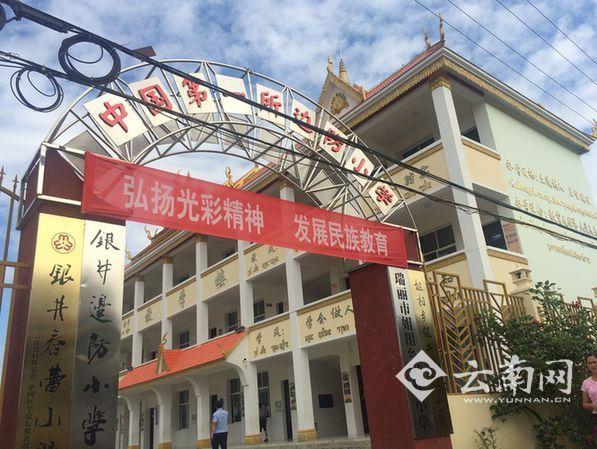Yunnan animal preserve is a monkey kingdom

Yunnan snub-nosed monkeys are popular among people because of their humanlike faces with bright red lips. [Photo provided to China Daily]
A reserve in Yunnan offers insights into a rare simian species' lives - and humans. Wang Kaihao and Li Yingqing report from Diqing, Yunnan.
Early to bed, early to rise makes a man healthy, wealthy and wise - and more likely to see black snub-nosed monkeys in Yunnan province's Weixi county.
The county in the Diqing Tibetan autonomous prefecture hosts a national park created to protect the rare primates, which visitors are more likely to spot soon after sunrise.
Guests discover sacrificing some shuteye is worth the eye-opening epiphanies they may encounter. Many explain the experience goes beyond viewing the creatures in the wild to consequently changing their worldviews about their own habitats.
They hop aboard electric carts and next hike up the mountainside for 40 minutes in the hope of seeing the simians, about 50 of which dwell in the park's snowy mountains.

Yunnan snub-nosed monkeys are popular among people because of their humanlike faces with bright red lips. [Photo provided to China Daily]
Shangri-La is often envisioned as a paradise - for humans. It is, indeed, also an Eden for other primates, a monkey kingdom in the truest sense.
This is their domain, set aside for them to rule.
The monkeys are the animal species most easily viewed closest to the park's entrance because the area serves as their primary foraging grounds. Fortunate visitors watch them zip up and down trees on their mission to find food.
They're also fed by people like Yu Lizhong, one of 28 rangers from the neighboring villages who patrol the Shangri-La National Park of Yunnan Snub-nosed Monkeys.
"The monkeys feast on a 'banquet' breakfast around 9 am and then take long naps out of visitors' sight," Yu says.
Consequently, the park closes at noon.
Yu gets up at 5 am to start his patrols to track the monkeys and sometimes returns at 8 pm.
Only two of the monkey's daily meals are delivered, so they spend their waking hours scouring the landscape for leaves, bamboo and fruit. Visitors are forbidden from feeding them.
"We need to keep them wild," Yu says.
"After all, they're not in a zoo."

Yunnan snub-nosed monkeys are popular among people because of their humanlike faces with bright red lips. [Photo provided to China Daily]
The primates are popular among people because of their striking features - humanlike faces with bright red lips.
French missionaries first recorded the species' existence in the 1890s.
Black snub-nosed monkeys, or Yunnan snub-nosed monkeys, were considered extinct in China until a Chinese expedition encountered them in the wild in the 1960s.
Even the most liberal estimate by The Nature Conservancy's primate expert Long Yongcheng puts the population around 3,500. Others project fewer than 2,000.
Most occupy Yunnan's northwest.

Yunnan snub-nosed monkeys are popular among people because of their humanlike faces with bright red lips. [Photo provided to China Daily]
Over 1,000 dwell in Weixi's 330-square-kilometer park, according to its statistics, making it the country's largest reserve for the species.
Yu also looks out for fires and hunts for poachers.
The ranger hasn't seen poachers face-to-face in over a decade on the job - but he has found ammunition casings.
"Villagers have protected the monkeys since I was a child," says Yu, who's in his 50s.
"But we have to protect them from outsiders."
The park received about 20,000 visitors last year, administrator He Liqing says.
"We can't allow unfettered tourism," he says.

The Shangri-La National Park of Yunnan Snub-nosed Monkeys in Weixi county, Yunnan province, is home to the country's largest reserve for the species. [Photo provided to China Daily]
"The priorities remain to protect the monkeys and conduct research."
That said, some outsiders come specifically to help, rather than harm.
Li Jie is one of two volunteers working in the park for a month.
The 24-year-old Henan province native was cycling through Yunnan when he was enticed by a volunteer project by the environmental NGO Green River.
"I couldn't continue the trip after seeing so many adorable animals," Li says.
"They live far from where I do. But every species is important to our greater ecosystem and will ultimately affect my life in ways like the butterfly effect. A sad truth is many other species that don't have striking facial features like black snub-nosed monkeys went extinct before the public noticed."
His revelation shows how many visitors experience unexpected philosophical realizations in the wilderness that they take home - that is, those beyond reinforcing the virtues of rising early.
Contact the writers through wangkaihao@chinadaily.com.cn
China Daily explores the country's shades of green in this series.

Yunnan snub-nosed monkeys are popular among people because of their humanlike faces with bright red lips. [Photo provided to China Daily]
If you go
Shangri-La National Park of Yunnan Snub-nosed Monkeys
An entry ticket costs 100 yuan ($14.6). Electric cart rides are 50 yuan.
The park is open 8 am to noon, and it's strongly recommended visitors arrive before 9 am.
It's efficient to stay in Tacheng town and hire a driver, which usually costs 150 yuan round-trip. It's advisable to bring oxygen bags (available at pharmacies) since elevations exceed 3,000 meters.
Your Comment
Name E-mailRelated News
-
;
-
-

-
Colorful Yunnan through the lens of Italian photographer
The unique aerial views of the paddy fields, which are in Yuanyang, Southwest China's Yunnan province, show the beautiful patterns created by the growing rice.
-
-
-

-
Yunnan: China’s first frontier primary school
It's in the first frontier primary school in China, Yinjing School, which is located in the small city of Ruili, a China-Burma borderland city in southwest China's Yunnan Province.
-
Based in Lhasa, Tibet Vista is a Tibet travel agency that specialized in Tibet permit, and Tibet tours for both private and group travelers at a local price!
•4 Days Lhasa City Group Tour from USD 460 •8 Days Everest Base Camp Group Tour from USD 850 •15 Days Mt.Kailash Group Tour from USD 1780 •2016 Tibet Train Tours from Beijing, Shanghai, Chengdu, Xining,etc










